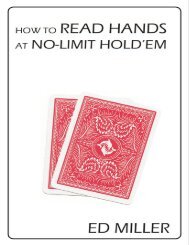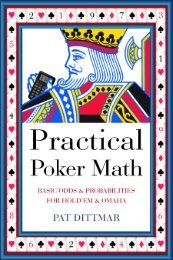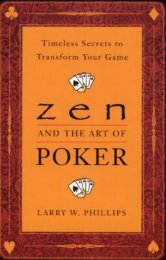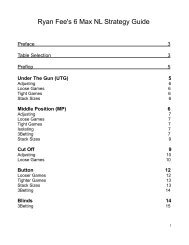You also want an ePaper? Increase the reach of your titles
YUMPU automatically turns print PDFs into web optimized ePapers that Google loves.
Let's look at the four As. We’ll start with the A♣. It can be<br />
paired one time with the other three As. Then the A♦ can be<br />
paired with the A♥ and the A♠. It’s already been paired with the<br />
A♣, so we can’t count that one again. Now this leaves the A♥<br />
being paired with the A♠. And the A♠ has already been paired<br />
with each of the others. So, this gives us six different unique<br />
combinations for pairing the As. There are six combinations of a<br />
paired hand per rank. One way to do this, without physically<br />
combining the cards, is to take the total number of cards in the<br />
group and then add together all the remaining numbers down to<br />
zero. 6 We have four cards in the group of As.<br />
3 + 2 + 1 = 6<br />
Let’s look at the impact of removing a card. Let’s say the flop<br />
has come down KA3. How many combinations of 33 can our<br />
opponent have for a set of 3s? Remember we said there are six<br />
combinations of pairs, but this isn’t correct now. One of the 3s<br />
is shown, so there are only three more possible for him to hold.<br />
How many unique, two-card combinations can be created from<br />
three cards?<br />
2 + 1 = 3<br />
There are three different combinations for him to hold a pair of<br />
3s when one of the 3s is exposed.<br />
73<br />
Let’s look at unpaired hands. We'll combine both the suited and<br />
unsuited combinations of these holdings. Let’s find out how<br />
many combinations there are of our opponent having an unpaired<br />
hand like AK (See Figure 7).<br />
6 Using the “combin” function in a spreadsheet software like Microsoft<br />
Excel will give you these answers quickly. For example, if, in a cell,<br />
you type “=combin(4,2)”, the result will be 6. Entering<br />
“=combin(52,2)” will produce 1,326. This is the number of unique<br />
hold’em starting hands.









